初中比较级和最高级完整版
形容词比较级和最高级(初中阶段)

形容词、副词的比较级和最高级的用法:形容词、副词的比较级和最高级的变化规律:1. 单音节形容词或副词后面直接加-er或-esttall—taller—tallest fast—faster—fastest2. 以-e结尾的单音节形容词或副词直接加-r或-stlarge—larger—largest nice—nicer—nicest3. 以-y结尾的形容词或副词,改-y为-i再加-er或-estbusy—busier—busiest early—earlier—earliest4. 形容词或副词是重读闭音节时,双写最后的辅音字母,再加-er或-est hot—hotter—hottest big—bigger—biggest5. 多音节形容词或副词前面直接加more或mostdelicious—more delicious—most deliciousbeautiful—more beautiful—most beautiful6. 不规则变化原级------比较级------最高级Good、well------better------best bad------worse------worstmany、much------more------most little-----less-------leastfar------farther, further------farthest, furthest old-----older,elder-----oldest,eldest形容词、副词的比较级和最高级的句子公式:1.同级比较原级(同级)比较:as…as…; not as(so)…as…Tom is as tall as Jim.This question is not as easy as that one.2.比较级形容词物体 A + am / are / is + 形比+ than + 物体B.I am taller than you.Pasta is more delicious than pizza.副词物体 A + 行为动词+ 副比+ than + 物体B.Cheetahs run faster than goats.He studies better than me.3. 最高级1)物体A + am / are / is + the + 形最高级+ 比较范围(of + 人/物,in +地方).I am the tallest in the class.Pasta is the most delicious food of the three.2)物体A + 行为动词+ 副词最高级+ 比较范围(of + 人/物,in + 地方). Cheetahs run fastest in the world.He studies best of us.(副词最高级前面省略the)The + 比较级,the + 比较级表示越。
100个七八年级形容词副词的比较级和最高级
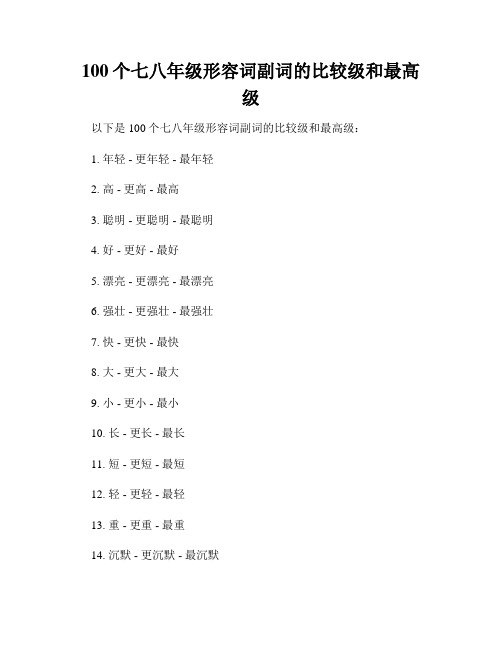
100个七八年级形容词副词的比较级和最高级以下是100个七八年级形容词副词的比较级和最高级:1. 年轻 - 更年轻 - 最年轻2. 高 - 更高 - 最高3. 聪明 - 更聪明 - 最聪明4. 好 - 更好 - 最好5. 漂亮 - 更漂亮 - 最漂亮6. 强壮 - 更强壮 - 最强壮7. 快 - 更快 - 最快8. 大 - 更大 - 最大9. 小 - 更小 - 最小10. 长 - 更长 - 最长11. 短 - 更短 - 最短12. 轻 - 更轻 - 最轻13. 重 - 更重 - 最重14. 沉默 - 更沉默 - 最沉默15. 明亮 - 更明亮 - 最明亮16. 老 - 更老 - 最老17. 干净 - 更干净 - 最干净18. 脏 - 更脏 - 最脏19. 安静 - 更安静 - 最安静20. 喧闹 - 更喧闹 - 最喧闹21. 繁忙 - 更繁忙 - 最繁忙22. 真实 - 更真实 - 最真实23. 可爱 - 更可爱 - 最可爱24. 难 - 更难 - 最难25. 容易 - 更容易 - 最容易26. 忙碌 - 更忙碌 - 最忙碌27. 宽 - 更宽 - 最宽28. 窄 - 更窄 - 最窄29. 美丽 - 更美丽 - 最美丽30. 简单 - 更简单 - 最简单31. 复杂 - 更复杂 - 最复杂32. 糟糕 - 更糟糕 - 最糟糕33. 热 - 更热 - 最热34. 冷 - 更冷 - 最冷35. 昂贵 - 更昂贵 - 最昂贵36. 便宜 - 更便宜 - 最便宜37. 深 - 更深 - 最深38. 浅 - 更浅 - 最浅39. 温暖 - 更温暖 - 最温暖40. 冰冷 - 更冰冷 - 最冰冷41. 丑陋 - 更丑陋 - 最丑陋42. 聒噪 - 更聒噪 - 最聒噪43. 爱 - 更爱 - 最爱44. 恨 - 更恨 - 最恨45. 难看 - 更难看 - 最难看46. 幸福 - 更幸福 - 最幸福47. 舒适 - 更舒适 - 最舒适48. 无聊 - 更无聊 - 最无聊49. 有趣 - 更有趣 - 最有趣50. 善良 - 更善良 - 最善良51. 内向 - 更内向 - 最内向52. 外向 - 更外向 - 最外向53. 勇敢 - 更勇敢 - 最勇敢54. 胆小 - 更胆小 - 最胆小55. 幽默 - 更幽默 - 最幽默56. 严肃 - 更严肃 - 最严肃57. 诚实 - 更诚实 - 最诚实58. 虚伪 - 更虚伪 - 最虚伪59. 忠诚 - 更忠诚 - 最忠诚60. 迟到 - 更迟到 - 最迟到61. 准时 - 更准时 - 最准时62. 强大 - 更强大 - 最强大63. 虚弱 - 更虚弱 - 最虚弱64. 困难 - 更困难 - 最困难65. 软 - 更软 - 最软66. 硬 - 更硬 - 最硬67. 紧张 - 更紧张 - 最紧张68. 放松 - 更放松 - 最放松69. 开心 - 更开心 - 最开心70. 悲伤 - 更悲伤 - 最悲伤71. 丰富 - 更丰富 - 最丰富72. 贫穷 - 更贫穷 - 最贫穷73. 羞涩 - 更羞涩 - 最羞涩74. 慷慨 - 更慷慨 - 最慷慨75. 吝啬 - 更吝啬 - 最吝啬76. 勤奋 - 更勤奋 - 最勤奋77. 懒惰 - 更懒惰 - 最懒惰78. 正直 - 更正直 - 最正直79. 懦弱 - 更懦弱 - 最懦弱80. 开放 - 更开放 - 最开放81. 闭塞 - 更闭塞 - 最闭塞82. 善解人意 - 更善解人意 - 最善解人意83. 自私 - 更自私 - 最自私84. 心胸狭窄 - 更心胸狭窄 - 最心胸狭窄85. 老实 - 更老实 - 最老实86. 不诚实 - 更不诚实 - 最不诚实87. 精明 - 更精明 - 最精明88. 天真 - 更天真 - 最天真89. 有礼貌 - 更有礼貌 - 最有礼貌90. 无礼貌 - 更无礼貌 - 最无礼貌91. 忍耐 - 更忍耐 - 最忍耐92. 不耐烦 - 更不耐烦 - 最不耐烦93. 胖 - 更胖 - 最胖94. 瘦 - 更瘦 - 最瘦95. 矮 - 更矮 - 最矮96. 瘦弱 - 更瘦弱 - 最瘦弱97. 开朗 - 更开朗 - 最开朗98. 内向 - 更内向 - 最内向99. 外向 - 更外向 - 最外向100. 喜欢 - 更喜欢 - 最喜欢。
初中英语语法之比较级最高级PPT课件
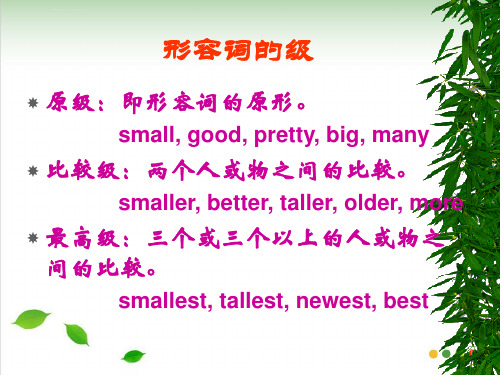
More examples: Mary is cleverer than her little sister. The new building is higher than the old one. His shirt is more expensive than mine. Kate is more beautiful than Lily is. She is five years older than I am. He is 2 centimeters taller than her. This ruler is 20 centimeters longer than that one.
形容词最高级的用法 (…in…; …of/among…) 那个短发的女孩是我们班最高的. 今天是一年中最热的一天. 他的房间是三个中最干净的一个. 上海是中国最大的城市.
The girl with red hair is the tallest in our class.
Today is the hottest day of the year.
原级
比较级
最高级
一般在词尾加-er/-est
small young
smaller younger
smallest youngest
以e结尾的形容词加-r/-st
nice large
nicer larger
nicest largest
重读闭音节结尾的词,词尾只有一个辅音字母,应先双写该字母,再加-er/-est
6、the + 形容词的比较级 + …… + the +形容词的比较级 表示“ 越……,就越……” The more you eat, the fatter you will be. The harder you study, the more you will get. The smaller the house is, the less it will cost. The sooner, the better.
(完整版)副词比较级不规则变化表(初中)

(完整版)副词比较级不规则变化表(初中)以下是初中阶段常见的副词比较级的不规则变化表:
1. 副词以-ly结尾的
- 原级:fast(快速地)
- 比较级:faster(更快地)
- 最高级:fastest(最快地)
2. 副词以-y结尾的
- 原级:easy(容易地)
- 比较级:easier(更容易地)
- 最高级:easiest(最容易地)
3. 副词以-e结尾的
- 原级:late(晚地)
- 比较级:later(更晚地)
- 最高级:latest(最晚地)
4. 不规则变化
- 原级:well(好地)
- 比较级:better(更好地)
- 最高级:best(最好地)
- 示例:
- He runs well.(他跑得好。
)
- She runs better than him.(她比他跑得更好。
)
- He runs the best.(他跑得最好。
)
- 原级:badly(糟糕地)
- 比较级:worse(更糟糕地)
- 最高级:worst(最糟糕地)
- 示例:
- He sings badly.(他唱得糟糕。
)
- She sings worse than him.(她比他唱得更糟糕。
)
- He sings the worst.(他唱得最糟糕。
)
这个表格可以帮助初中学生掌握常见副词比较级的不规则变化,用于写作和口语表达中的比较句型。
通过练习和记忆这些不规则变化,学生可以有效地提高自己的语言能力。
(完整版)初二形容词副词比较级、最高级

比较级&最高级一、分类:形容词和副词有原级、比较级和最高级三级。
原级变为比较级和最高级有规则变化和不规则变化两种。
二、规则变化:形容词和副词的比较级和最高级的变化方法如下(1) 符合规则的:(2)几个不规则的形容词和副词的比较级和最高级如下表:三、形容词和副词的原级、比较级和最高级的用法:1e.g. This room is bigger than that one. I am taller than you.This lesson is more difficult than that one.注意:①修饰比较级的词有a little, a bit ,a few , a lot ,much, even,still,far,rather,any 等表程度。
e.g. Today is _________ colder than yesterday(冷得多/一点)②为避免重复,在从句中常用the one 代替可数名词单数形式,调和ones 或those代替可数名词的复数形式,that代替不可数名词。
E.g. The weather in Tianjin is colder than______of Guangzhou in winter.2、表示“…不如…”,用“less+原级+than”结构e.g. The book is less difficult than that one. The film is less interesting than that one3、不与其他事物相比,表示本身程度的改变,用“比较级+and+比较级”结构,意思是“越来越…”e.g. The weather is getting______ ______ . ______ (越来越暖和)Our country is becoming _____ ______ . ______ (越来越漂亮)4、表示“两者之间比较。
[全]初中英语语法比较级和最高级知识点详解
![[全]初中英语语法比较级和最高级知识点详解](https://img.taocdn.com/s3/m/34cbcc7d3d1ec5da50e2524de518964bcf84d2bc.png)
[全]初中英语语法比较级和最高级知识点详解初中英语语法比较级和最高级知识点形容词、副词比较级和最高级一、定义。
比较级:两者之间的比较叫做比较级。
最高级:三者三者以上的比较叫做高级。
原级:没有比较,同级比较。
二、形容词、副词的比较级/最高级的构成。
1、单音节和部分双音节的词:(去,改,双,直)(1)以字母e结尾的形容词,去e加-er或-est;large——larger——largestXXXlate——later——latest(2)以“辅音字母+y”结尾的双音节词,先改“y”为“i”,再加happy——happier——happiestearly——earlier——earliest-er或-est;(3)辅-元-辅结构的单词(重读闭音节)的形容词,双写最后一个辅音字母再加er或者est;hot—hotter—hottestXXX——XXX——XXX(4)在末端加er大概est;strong——stronger——strongestslow——slower——slowest2、多音节词和部分双音节词:在词前加more或most。
delicious——more delicious——most deliciousbeautiful——more beautiful——most beautifulboring——more boring——most boringeasily——more easily——most easily3、不划定规矩变革(两个好,两个坏,两个多;一个小又少,另有一远和一老。
)good/well——better——XXX bad/ill/badly——worse——worstmuch/many——more——mostlittle——less——XXXXXX——XXXold——older/elder——XXX(farther是指距离或时间上"更远的''further是指程度上进一步的)4.特殊变化:既可以+er/est,又可以+more/most的单词有clever,handsome,polite,Simple,stupid,friendly。
(完整版)比较级和最高级列表
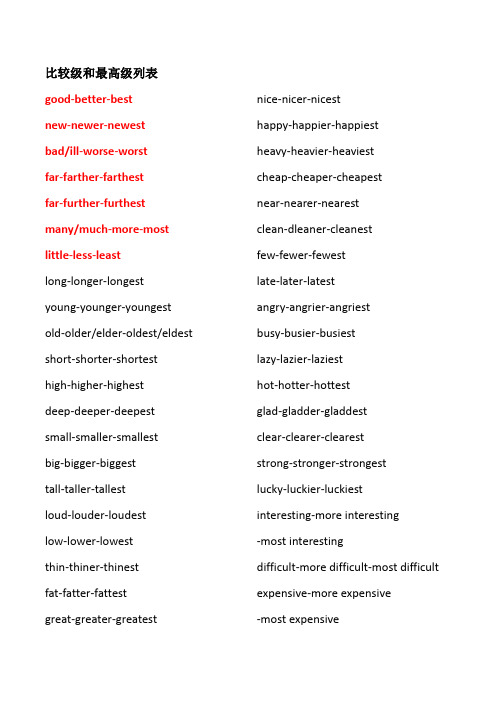
比较级和最高级列表good-better-bestnew-newer-newestbad/ill-worse-worstfar-farther-farthestfar-further-furthestmany/much-more-most little-less-leastlong-longer-longestyoung-younger-youngest old-older/elder-oldest/eldest short-shorter-shortesthigh-higher-highestdeep-deeper-deepestsmall-smaller-smallestbig-bigger-biggesttall-taller-tallestloud-louder-loudestlow-lower-lowestthin-thiner-thinestfat-fatter-fattestgreat-greater-greatest nice-nicer-nicesthappy-happier-happiestheavy-heavier-heaviestcheap-cheaper-cheapestnear-nearer-nearestclean-dleaner-cleanestfew-fewer-fewestlate-later-latestangry-angrier-angriestbusy-busier-busiestlazy-lazier-laziesthot-hotter-hottestglad-gladder-gladdestclear-clearer-cleareststrong-stronger-strongestlucky-luckier-luckiestinteresting-more interesting-most interestingdifficult-more difficult-most difficult expensive-more expensive-most expensive形容词比较级、最高级的构成一、规则变化1. 单音节词和少数双音节词(1)一般情况在原级词尾加-er构成比较级,加-est构成最高级。
(完整版)比较级和最高级

(完整版)比较级和最高级一、形容词的比较级和最高级变化规则;1、规则变化:(1) 单音节词和少数双音节词一般在词尾加er或est:如: small ---smaller --- the smallest(2) 以不发音的e字母结尾的加r,或st:如: late --- later --- the latest(3) 以辅音字母加y结尾的变y为I加er或est:如: easy --- easier --- the easiest(4)以一个辅音字母结尾的重读闭音节词双写最后一个辅音字母再加er或est:如: big --- bigger --- the biggest以er,ow结尾的双音节词加er 或est如: slow --- slower --- the slowest(5) 多音节词前加more或most, 副词最高级前省略the.如: important --- more important --- the most important2.不规则变化good / well --- better --- the best 好bad / badly / ill --- worse --- the worst 坏many / much --- more --- the most 多little --- less --- the least 少old --- older / elder --- the oldest / the oldest 老, 旧far --- farther / further --- the farthest / the furthest 远常见形容词比较级、最高级变化一览表1.在形容词词尾加上“er”“est”构成比较级、最高级:bright(明亮的)—brighter—brightest broad(广阔的)—broader—broadest cheap(便宜的)—cheaper—cheapest clean (干净的)—cleaner—cleanestclever(聪明的)—cleverer—cleverest cold(寒冷的)—colder—coldest cool(凉的)—cooler—coolest dark(黑暗的)—darker—darkest deep(深的)—deeper—deepest fast(迅速的)—faster—fastestfew(少的)—fewer—fewest great(伟大的)—greater—greatest hard(困难的,硬的)—harder—hardest high(高的)—higher—highest kind(善良的)—kinder—kindest light(轻的)—lighter—lightest long(长的)—longer—longest loud(响亮的)—louder—loudestlow(低的)—lower—lowest near(近的)—nearer—nearest new(新的)—newer—newest poor(穷的)—poorer—poorestquick(快的)—quicker—quickest quiet(安静的)—quieter—quietestrich(富裕的)—richer—richest short(短的)—shorter—shortestslow(慢的)—slower—slowest small(小的)—smaller—smallest smart(聪明的)—smarter—smartest soft(柔软的)—softer—softest strong(强壮的)—stronger—strongest sweet (甜的)—sweeter—sweetest tall(高的)-taller-tallest thick(厚的)—thicker—thickest warm(温暖的)—warmer—warmest weak(弱的)—weaker—weakest young(年轻的)—younger—youngest2.双写最后一个字母,再加上“er”“est”构成比较级、最高级:big(大的)—bigger—biggest fat(胖的)—fatter—fattesthot(热的)—hotter—hottest red(红的)—redder—reddestsad(伤心的)—sadder—saddest thin(瘦的)—thinner—thinnestwet(湿的)—wetter—wettest mad(疯的)—madder—maddest3.以不发音的字母e结尾的形容词,加上“r”“st”构成比较级、最高级:able(能干的)—abler—ablest brave(勇敢的)—braver—bravest close(接近的)—closer—closest fine(好的,完美的)—finer—finest large(巨大的)—larger—largest late(迟的)—later—latestnice(好的)—nicer—nicest ripe(成熟的)—riper—ripestrude(粗鲁的)—ruder—rudest safe(安全的)—safer—safest strange(奇怪的)—stranger—strangest wide(宽广的)—wider—widest wise(睿智的,聪明的)—wiser—wisest white(白的)—whiter—whitest4.以字母y结尾的形容词,把y改为i,再加上“er”“est”构成比较级、最高级:busy(忙碌的)—busier—busiest dirty(脏的)—dirtier—dirtiest dry(干燥的)—drier—driest early(早的)—earlier—earliest easy(容易的)—easier—easiest friendly(友好的)—friendlier—friendliest funny(好玩的)—funnier—funniest happy(开心的)—happier—happiest healthy(健康的)—healthier—healthiest heavy(重的)—heavier—heaviest hungry(饿的)—hungrier—hungriest lazy(懒惰的)—lazier—laziestlucky(幸运的)—luckier—luckiest naughty(调皮的)—naughtier—naughtiest noisy(嘈杂的)—noisier—noisiest pretty (美丽的)—prettier—prettiest silly(傻的)—sillier—silliest spicy(辣的)—spicier—spiciestthirsty(渴的)—thirstier—thirstiest ugly(丑的)—uglier—ugliest4.双音节、多音节形容词,在单词前面加上“more”“most”构成比较级、最高级:afraid(害怕的)—more afraid—most afraidbeautiful(美丽的)—more beautiful—most beautifulcareful(仔细的)—more careful—most carefulcheerful(开心的)—more cheerful—most cheerfulcrowded(拥挤的)—more crowded—most crowdeddangerous(危险的)—more dangerous—most dangerous delicious(美味的)—more delicious—most deliciousdifficult(困难的)—more difficult—most difficultexciting(令人兴奋的)—more exciting—most excitingexpensive(昂贵的)—more expensive—most expensivefamous(著名的)—more famous—most famousfrightened(受惊的)—more frightened—most frightened frightening(令人害怕的)—more frightening—most frighteninghard-working(勤奋的)—more hard-working—most hard-workinghelpful(有帮助的)—more helpful—most helpfulhonest(诚实的)—more honest—most honestimportant(重要的)—more important—most importantinteresting(有趣的)—more interesting—most interesting polite(有礼貌的)—more polite—most politeterrible(可怕的)—more terrible—most terribletired(累的)—more tired—most tired5.不规则变化的形容词:bad(坏的)—worse—worst good(好的)—better—bestfar(远的)—farther—farthest (far—further—furthest)ill(病的)—worse—worst little(少的)—less—leastmany(多的)—more—most much(多的)—more—most old(年老的)—older—oldest ( old—elder—eldest)well(好的,身体好的)—better—best一. 写出下列形容词或副词的比较级和最高级.bad ________________ ______________________________clean ________________ ______________________________ famous ______________ _______________________dirty _________________ ______________________________big __________________ _____________________________small _________________ ______________________________heavy _____________ ______________________little __________________ ______________________________hard __________________ ______________________________ happy _________________ ______________________________far ___________________ ______________________________ expensive _____________________ ________________________________ well _________________ ______________________________easy __________________ ______________________________ wide ___________________ _______________________________ young _________________ ________________________________ rude ___________________ ________________________________ cheap ___________________ _______________________________ ugly __________________ _________________________________ busy ___________________ ________________________________ old ____________________ _________________________________ noisy __________________ _________________________________ interesting _____________________ _______________________________ hot ____________________ _________________________________ cold ___________________ _________________________________ many __________________ ________________________________ bright __________________ _______________________________ boring __________________ _______________________________ difficult _______________________ ________________________________ beautiful _______________________ _____________________________thin _____________________ _______________________________ good ____________________ _______________________________ strong____________________ ______________________________ high _________________ _______________________warm ________________ _______________________late __________________ _______________________weak _________________ ______________________tall ___________________ ______________________short __________________ ______________________loud ___________________ ______________________lazy ___________________ ______________________quick __________________ ______________________angry __________________ ______________________clever __________________ ______________________smart __________________ ______________________low ____________________ __________________二、选择填空1. Which does Jimmy like _____ , Chinese or Art?A. wellB. bestC. betterD. much2. The Changjiang River is one of _____ in the world.A. the longest riverB. longest riversC. the longest riversD. longer rivers3. _____ of the two women is Mrs Brown.A. The beautifulB. The more beautifulC. More beautifulD. The most beautiful4. My mooncake is nicer _____ his.A. likeB. withC. forD. than5. You are fatter than _____ .A. heB. hisC. himD. he is tall6. He jumps _____ of the three.A. farB. furtherC. farthestD. furthest7. My hair is longer than _____ .A. my sisterB. KateC. my brother’sD. Lucys’8. There are _____ paper here .Please bring some.A. littleB. lessC. fewerD. a little9. The pen is _____ than that one.A. more cheapB. cheapC. much cheaperD. quite cheaper10.Tom speaks Chinese _____ better than Jimmy.A. moreB. veryC. a lot ofD. much11.There are _____ girls in Class Two than in Class Four.A. moreB. nicestC. mostD. best12.It’s too _____ for you to do that.A. easyB. more dangerousC. harderD. the easiest13.Who has _____ apples now, Jim, Lily or Lucy?A. muchB. biggestC. betterD. the most14.You have more rulers than me. But _____ are nicer than _____ .A. mine, yoursB. mine, yourC. my, yoursD. my, your15.Tingting is _____ than Meimei, but Meimei is _____ than Tingting.A. all, strongerB. taller, strongestC. tallest, strongD. taller, stronger16.Mother is _____ in my family.A. busyB. busierC. the busiestD. more busy17.There are _____ in the park on Sunday.A. more childrenB. a lot of peopleC. much men and womenD. many peoples18.-This blue sweater is too big for me .-Will you please show me a _____ one?A. smallB. smallerC. the smallestD. smallest19.No one is _____ Mary in the class.A. so tallest asB. as taller asC. so high asD. so tall as20. This bike is _____ than that one.A. twenty yuan dearB. twenty yuan dearerC. dear twenty yuanD. dearer twenty yuan[参考答案] CCDDA CDBCD AADAD CBBDB三、用所给词的适当形式填空1.Your classroom is _____ (wide) and _____ (bright) than ours.2.There are _____ (few) hours of sunlight a day in winter than in summer.3.Which do you like _____ (well) , maths or chemistry?4.This is the _____ (good) film I have ever seen.5.Africa is the second _____ (large) continent.6.What he said made his mother much _____ (angry) .7.I’m not as _____ (careful) as he.8.We’ve got as _____ (many) books as we need.9.Pratice as _____ (much) as you can.10.They have done _____ (much) work with _____ (little) money.11.You’re the _____ (kind) person I’ve ever met.12.He is _____ (young) than his two sisters.13.The _____ (old) I get, the _____ (strong) I seem to feel.14.The weather is getting _____ (warm) and _____ (warm) .15.Summer is _____ (hot) season of the year.[参考答案] 1. wider, brighter 2. fewer 3. better 4. best 5. largest 6. angry 7. careful 8. many 9. much 10. more, less 11. kindest 12. younger 13. older, stronger, 14. warmer, warmer 15. the hottest。
(完整版)初中英语比较级和最高级
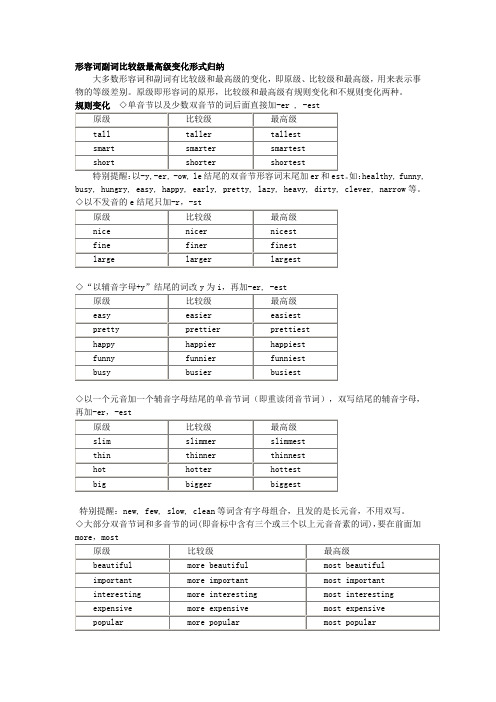
◇下列形容词和副词没有比较级和最高(即表示“最高程度”或“绝对状态”的形容词和副词没有比较级和最高级)empty, wrong, perfect, unique, extreme, excellent, favourite, true, right, correct, extremely ...形容词副词比较级最高级使用注意事项◇比较应在同类事物之间进行。
误:Your English is better than me.正:Your English is better than mine.◇比较级前可以有一个表示程度的状语,最常见的三大修饰词是:a little, much, even。
以下单词也可用来修饰:any, far, still, a lot, yet, rather。
My sister is a little taller than me.Their house is much larger than ours.另外,名词短语也可修饰比较级,说明程度。
I’m three years older than he.特别提醒:very, quite, too不可修饰比较级。
◇避免重复使用比较级。
误:He is more kinder to small animals than I.正:He is much kinder to small animals than I.误:He is more cleverer than his brother.正:He is cleverer than his brother.◇比较要符合逻辑,在同一范围内比较时,避免将主语含在比较对象中,这时需使用other来排除自身。
误:China is larger that any country in Asia.正:China is larger than any other country in Asia.误:John studies harder than any student in his class.正:John studies harder than any other student in his class.正:John studies harder than any of the other students in his class.正:John studies harder than anyone else in his class.◇比较要遵循前后一致的原则,注意前后呼应。
完整版中考英语比较级最高级专项
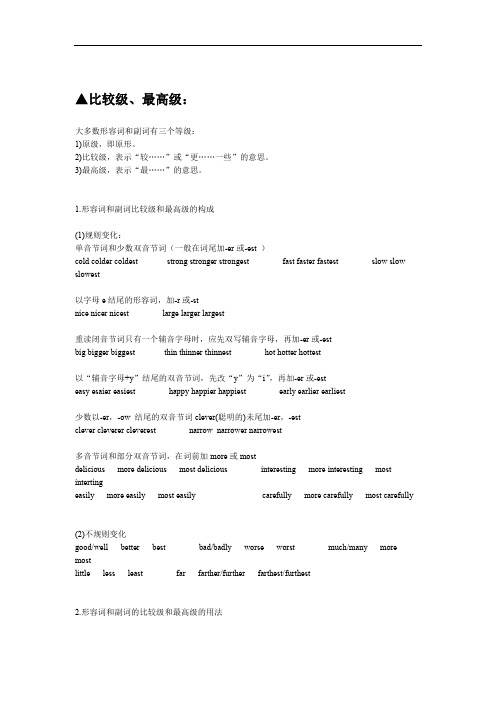
▲比较级、最高级:大多数形容词和副词有三个等级:1)原级,即原形。
2)比较级,表示“较……”或“更……一些”的意思。
3)最高级,表示“最……”的意思。
1.形容词和副词比较级和最高级的构成(1)规则变化:单音节词和少数双音节词(一般在词尾加-er或-est )cold colder coldest strong stronger strongest fast faster fastest slow slow slowest以字母e结尾的形容词,加-r或-stnice nicer nicest large larger largest重读闭音节词只有一个辅音字母时,应先双写辅音字母,再加-er或-estbig bigger biggest thin thinner thinnest hot hotter hottest以“辅音字母+y”结尾的双音节词,先改“y”为“i”,再加-er或-esteasy esaier easiest happy happier happiest early earlier earliest少数以-er,-ow结尾的双音节词clever(聪明的)未尾加-er,-estclever cleverer cleverest narrow narrower narrowest多音节词和部分双音节词,在词前加more或mostdelicious more delicious most delicious interesting more interesting most intertingeasily more easily most easily carefully more carefully most carefully(2)不规则变化good/well better best bad/badly worse worst much/many more mostlittle less least far farther/further farthest/furthest2.形容词和副词的比较级和最高级的用法比较级:表示两者(人或事物)的比较Mr King is taller than Mr ReadThis mooncakes is nicer than that one。
完整版)初中英语比较级和最高级的用法

完整版)初中英语比较级和最高级的用法英语语法——比较级和最高级的用法在英语中,我们通常使用以下方式表示比较级和最高级:在形容词或副词前加more(如more natural。
XXX)或者加上后缀-er(newer。
sooner)。
这些方式典型地表示形容词或副词所表示的质量、数量或关系的增加。
在英语句子中,将两个主体进行比较的方法被称为“比较句型”。
其中,“A比B 更……”的表达方式称为比较级,“A最……”的表达方式则称为最高级。
构成句子的方式是将形容词或副词变成比较级或最高级的形态。
一、形容词和副词的比较级和最高级的构成规则1.一般单音节词和少数以-er、-ow结尾的双音节词,比较级在后面加-er,最高级在后面加-est。
例如:small → smaller → smallest。
short → shorter → shortest。
tall → taller → tallest。
great → greater → greatest。
2.以不发音e结尾的单音节词,比较级在原级后加-r,最高级在原级后加-st。
例如:large → larger → largest。
nic e → nicer → nicest。
able → abler → ablest。
3.在重读闭音节(即:辅音+元音+辅音)中,先双写末尾的辅音字母,比较级加-er,最高级加-est。
例如:big → bigger → biggest。
hot → XXX → hottest。
fat → fatter → fattest。
4.以“辅音字母+y”结尾的双音节词,把y改为i,比较级加-er,最高级加-est。
例如:easy → easier → easiest。
heavy → XXX → XXX。
b usy → busier → busiest。
happy → happier → happiest。
5.其他双音节词和多音节词,比较级在前面加more,最高级在前面加most。
(完整版)初中英语语法形容词和副词的比较级和最高级

注意:有些形容词,如dead, empty, round, sure, woolen 等受本身含义的限制,没有比较级。
相关结构1)原级比较:肯定句as….as…., 否定句not so / as….as…..2)比较句:比较级+than….或more (less)+adj ….than…..The furniture in this shop is less beautiful than that in that shop.(注意代词that的用法)3)比较级+and+比较级或more and more+比较级“越来越… ”richer and richer, more and more interesting4)The more….., the more…..“越…,越…”The more you look at the picture, the better you will like it.5) 比较级+than any other +n. (单)(适用于范围一致时)(all) other +n.(复)any +n.(单) (适用于范围不一致时)He is taller than any other student / all other students in his class.any student in my class.6) 倍数表达法。
A is three(four, etc.)times the size(height, length etc.)of B.A is three(four, etc.)times as big(high, long, etc.)as B.A is three (four, etc.)times bigger(higher, longer, etc.)than B.用times 表倍数通常用于三倍以上,两倍可以用twice或double.The new building is four times the size (the height)of the old one.这座新楼比那座旧楼大三倍(高三倍)。
初中比较级最高级

I.常见的形容词及比较级和最高级的构成(1)规则变化:①单音节和部分双音节的形容词普通在词尾加-er 或 -estEg: calm---calmer tall---taller smart---smarter②以字母 e 结尾的直接在词尾加-r 或 -stEg: nice---nicer fine---finer large---larger③以“辅音+y 结尾的词,变 y 为 i,再加-er” 或 -estEg: early---earlier happy---happier busy---busier④以重读闭音节的单个辅音字母结尾的词,双写辅音字母,再加-er 或-estEg:big---bigger ---biggest thin---thinner ---thinnest hot---hotter---hottest fat---fatter---fattest⑤多音节或部分双音节的形容词在原级前面加 more 或 the most Eg: popular---more popular ---the most popular important---more important—the most important(2)特殊变化:II.形容词比较级的使用方法:表达两者(人或物)的比较。
1.体现“A不不大于B”用 A … 比较级+than B①. Tom比我胖。
Tom is fatter than me.②. 他的头发比我的短。
His hair is shorter than mine.He has shorter hair than me.(注意比较对象的一致性)③ . 英语比语文重要。
English is more important than Chinese.④. 我来的比你晚。
I come later than you.(副词的比较级)Tom is (outgoing) than any other boy in his class.The short one is (expensive) than the long one.这个故事不如那个有趣。
(完整版)比较级和最高级列表

(完整版)比较级和最高级列表比较级和最高级列表good-better-bestnew-newer-newestbad/ill-worse—worst far—farther-farthestfar-further—furthestmany/much-more—mostlittle-less-least long—longer—longest young—younger-youngest old—older/elder-oldest/eldest short-shorter—shortest high—higher—highestdeep-deeper—deepest small—smaller-smallestbig-bigger—biggesttall-taller-tallest loud—louder-loudest low—lower—lowestthin—thiner-thinestfat-fatter-fattest great—greater—greatest nice—nicer—nicest happy—happier-happiestheavy-heavier—heaviestcheap-cheaper—cheapest near—nearer-nearestclean-dleaner-cleanest few—fewer—fewest late—later—latestangry-angrier-angriestbusy-busier-busiestlazy-lazier-laziest hot—hotter—hottest glad—gladder—gladdest clear—clearer-cleareststrong-stronger—strongest lucky—luckier-luckiest interesting-more interesting-most interestingdifficult—more difficult-most difficultexpensive-more expensive—most expensive形容词比较级、最高级的构成一、规则变化1. 单音节词和少数双音节词(1)一般情况在原级词尾加—er构成比较级,加-est构成最高级。
初中比较级和最高级PPT课件

It’s our largest machine in our factory.
第二十六页,编辑于星期五:一点 三十三分。
6.This is/ was the最高级+名词+that定语从句
这是…里面,最…
This is the worst film that I have seen these years.
2.表 “最……之一”
…one of the+最高级+名词复数
…是最…之一
e.g.The city is one of the most beautiful cities in the world. Lu Xun is one of the greatest writers last century.
人 :
He is the better of the two.
彭
险
峰
第十二页,编辑于星期五:一点 三十三分。
6、表示在两者之间相差的程度用“具体数 字+比较级+ than+ 比较对象”。
eg: The road is two metres longer than that one .
这条公路比那条公路长两米。
第二十三页,编辑于星期五:一点 三十三分。
3.Which/Who…+ 比较级,A or B? Which/Who…+ 最高级,A ,B or C?
e.g.Who is older, Jim or Tom ?
Who is the tallest, Jim , Mike or Tom
Which language is ____ , English, French or Chinese? A. difficult B. more difficult C. the most difficult
初中英语比较级_最高级_讲解及练习(全)
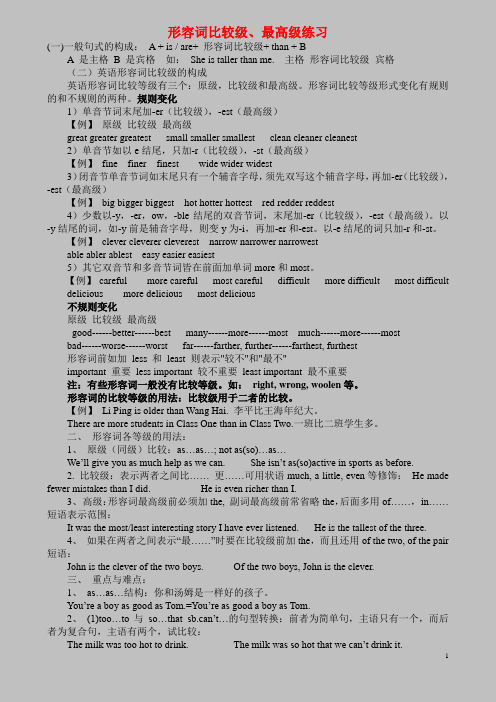
形容词比较级、最高级练习(一)一般句式的构成:A + is / are+ 形容词比较级+ than + BA 是主格B 是宾格如:She is taller than me. 主格形容词比较级宾格(二)英语形容词比较级的构成英语形容词比较等级有三个:原级,比较级和最高级。
形容词比较等级形式变化有规则的和不规则的两种。
规则变化1)单音节词末尾加-er(比较级),-est(最高级)【例】原级比较级最高级great greater greatest small smaller smallest clean cleaner cleanest2)单音节如以e结尾,只加-r(比较级),-st(最高级)【例】fine finer finest wide wider widest3)闭音节单音节词如末尾只有一个辅音字母,须先双写这个辅音字母,再加-er(比较级),-est(最高级)【例】big bigger biggest hot hotter hottest red redder reddest4)少数以-y,-er,ow,-ble结尾的双音节词,末尾加-er(比较级),-est(最高级)。
以-y结尾的词,如-y前是辅音字母,则变y为-i,再加-er和-est。
以-e结尾的词只加-r和-st。
【例】clever cleverer cleverest narrow narrower narrowestable abler ablest easy easier easiest5)其它双音节和多音节词皆在前面加单词more和most。
【例】careful more careful most careful difficult more difficult most difficult delicious more delicious most delicious不规则变化原级比较级最高级good------better------best many------more------most much------more------mostbad------worse------worst far------farther, further------farthest, furthest形容词前如加less 和least 则表示"较不"和"最不"important 重要less important 较不重要least important 最不重要注:有些形容词一般没有比较等级。
- 1、下载文档前请自行甄别文档内容的完整性,平台不提供额外的编辑、内容补充、找答案等附加服务。
- 2、"仅部分预览"的文档,不可在线预览部分如存在完整性等问题,可反馈申请退款(可完整预览的文档不适用该条件!)。
- 3、如文档侵犯您的权益,请联系客服反馈,我们会尽快为您处理(人工客服工作时间:9:00-18:30)。
形容词副词比较级和最高级的构成 一、大多数形容词和副词有比较级和最高级的变化,即原级、比较级和最高级,用来表示事物的 等级差别。
原级即形容词的原形,比较级和最高级有规则变化和不规则变化两种。
1)单音节词加词尾 -er , -est 来构成比较级和最高级。
tall ( 高的 ) taller tallest great (巨大的)greater greatest 2)以不发音的 e 结尾的单音节词只加 -r,-st
nice (好的) nicer large (大的) larger
able (有能力的)abler nicest largest ablest 3)以一个辅音字母结尾的闭音节单音节词,双写结尾的辅音字母,再加 -er , -est big (大的) bigger biggest
hot 热的 ) hotter hottest red 红色的 redder reddest 4)"以辅音字母+y"结尾的双音节词, 改y 为i ,再加-er , -est easy (容易的) easier busy (忙的) busier 5)以 ly 结尾的副词,除 easiest busiest early-earlier-earliest 其他都是加 more most. Slowly-more slowly-most slowly Bravely-more bravely-most bravely quickly-more quickly-most quickly 6)少数以 -er , -ow 结尾的双音节词未尾加 -er , -est
clever (聪明的) cleverer cleverest narrow (窄的) narrower narrowest
7) 其他双音节词和多音节词在前面加 important ( 重要的 ) more
important easily (容易地)more easily 8) 一些词的比较级和最高级,可以
加 more , most 来构成比较级和最高级。
如: most important most easily -er 或 -est ,也可以加 more 或 most ,如:clever, polite 等。
9不规则变化 有一些词的比较级、最高级变化是不规则的,需要特殊记忆。
如: good / well better ^ best bad / ill/badly worse n worst
many / much more ^ most little T less f least far T farther T farthest (表示距离)/ far T further T furthest (表示程度)
old t older / elder t oldest (表示新旧或年龄 ) / eldest (表示兄弟姐妹之间的长幼关系 ) 副词的比较级和最高级的构成规则和形容词比较级和最高级的构成规则一样,所不同的是:形容词最高级 前面必须用the ,而副词的最咼级前面的 一些词本身没有比较级和最高级形式,如:
the 可带可不带。
right, wrong, full, empty, round, complete, wooden, dead, daily 等。
long-longer-longest
young-younger-youngest old-older/elder-oldest/eldest short-shorter-shortest high-higher-highest deep-deeper-deepest small-smaller-smallest big-bigger-biggest tall-taller-tallest loud-louder-loudest low-lower-lowest thin-thiner-thinest fat-fatter-fattest great-greater-greatest nice-nicer-nicest happy-happier-happiest heavy-heavier-heaviest cheap-cheaper-cheapest near-nearer-nearest clean-dleaner-cleanest few-fewer-fewest late-later-latest angry-angrier-angriest busy-busier-busiest lazy-lazier-laziest hot-hotter-hottest glad-gladder-gladdest clear-clearer-clearest strong-stronger-strongest lucky-luckier-luckiest interesting-moreinteresting-most interesting difficult-more difficult-most difficult expensive-more expensive-most expensive
形容词比较级的用法
1. 两者比较时用形容词比较级,其结构为“ ... 比较级+ than ...”。
如:Actions speak louder than words.
2. 在两者之间选择“哪一个更... ”时,用句型" Which / Who is +比较级,…or...?”。
女口:Which sweater is cheaper, the red one or the yellow one?
3. 表示"两者之间最.... 的一个”时,用" the +比较级”。
如:Lucy is the taller of the twins.
4. 表示"越.... ,越... ”时,用" the + 比较级,the + 比较级”。
如:The more you eat, the fatter you will become.
5. 表示"越来越.... ”时,用"比较级+ and +比较级”,多音节词和部分双音节词用“ more and more +形容词原级”。
如:We should make our country more and more beautiful.
6. 形容词比较级前可以用下列词修饰:much, a little, far, a bit, a few, a lot, even, still, rather 等。
如:It's much colder today than yesterday.
形容词最高级的用法
1. 三者或三者以上的人或物进行比较时,用形容词最高级形式。
形容词最高级前通常需加定冠词the,句末
常接in / of 短语来表示范围。
如:He is the strongest of all the boys.
2. 表示"最... 之一” 时,用“one of + the + 最高级”。
如:The light bulb is one of the most helpful inventions.
3. 形容词最高级前可以由物主代词、指示代词、名词所有格等修饰,此时不用定冠词the。
如:Yesterday is her happiest day in her life
1. 比较级的修饰语
Much( ... 得多),far(••…得多),even(甚至,更),still(更),a bit(有点),a little(有点),a lot (很),a great
deal(大大地),twice(两倍),five times(五倍),two-fifths(五分之二),a half(一半)等修饰比较级表示程度,但决不可用very 修饰。
eg. Tom is a little taller than Mike. Tom 比Mike 稍高一点;
It is even colder today than yesterday. 今天甚至比昨天更冷
2. 最高级的修饰语
By far/ far and away 最,很much .......... 得多almost 几乎nearly 几乎
另外, second, third , next 等也要放在定冠词之后。
如:
The Yellow River is the second longest in China. 黄河是中国的第二大河。
This is the third largest building in this city. 这是这个城市里第三大的建筑物。
The Yellow River is the second longest river in China. 黄河是中国第二长河。
This is (by) far the best book that I've ever read. 这是我读过的最好的书。
